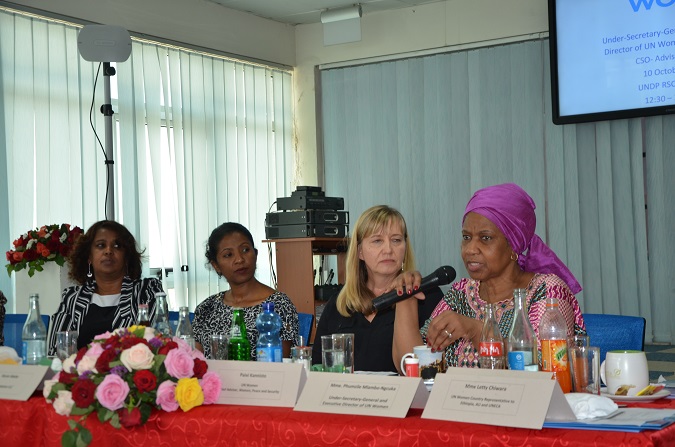“The Ethiopian story is a miracle - but development of a country doesn’t equate equity, equality and inclusion”, says UN Women Executive Director
Date:

On the margins of her engagement with the UN-AU joint mission to South Sudan and the subsequent AU Peace and Security Council briefing, the Executive Director of UN Women Dr. Phumzile Mlambo-Ngcuka met and had a conversation with the UN Women Civil Society Advisory Group (CSAG) in Addis Ababa.
The current CSAG formed in 2014, according to the chairwoman appreciated the opportunity and space provided to interact with UN Women and provide strategic advice on UN Women thematic priorities that are instrumental in informing the strategic planning and knowledge products. She further commended UN Women for providing CSOs in Ethiopia the space to engage with other CSOs and participate in other regional and global events while at the same time creating a conducive environment for them to itneract among themselves to and share ideas and best practices.. Thanks to UN Women, women’s voices and representation in the ongoing discussions to revise the restrictive CSO Law in Ethiopia has been possible, she further underlined Through this platform, UN Women has revived the hope and ability for CSOs in Ethiopia to come together to discuss GEWE issues and challenges affecting them – while at the same time providing UN Women with strategies for keeping alive a movement which had been crippled by the restrictive CSO Law.
The members of the group briefed the Executive Director on the 2009 “Charities and Societies Proclamation No. 621/2009” that limited CSOs from working on human rights, gender issues, governance and democratization. Since then, the work of women’s organizations has been significantly weakened, as many organizations became resident charities, not allowed to engage on certain issues and receive foreign funding including funding from the UN system.
The progressive administration of the country, has initiated broad consultations across the country to review and revise the charities and societies law – and members of the UN Women CSAG are represented in the Committee working on these revisions. Considering the positive political developments in Ethiopia, the CSAG members recommended for UN Women to provide capacity building for CSOs as most of the advocacy and right based CSOs have been weakened since the passing of the CSO law in 2009. The upcoming national elections, are also a great opportunity to leverage the changing political landscape as space for political participation is broadening. CSAG members further urged UN Women to support women’s participation and leadership in politics - not only as voters, but also as candidates. They also raised concerns that, despite the new developments, the gender agenda is still missing in the whole political discourse and advocating for women’s agenda to be put on the table with Government should be a key part UN Women’s work.
The UN Women Executive Director on her part expressed her appreciation for the new opportunities in Ethiopia and said she is encouraged to see that CSAG is already thinking about how UN Women can reposition itself to support civil society and women’s rights groups to benefit from the political developments. She said “the fact that women’s agenda is not included in the new political discourse is something to drive us to do something about. Our proactiveness is quite important and urgent”.
“The Ethiopian story is sort of a miracle”, she said, adding “it has proven that in a generation, you can change the positioning of a country. But a change in position of a country doesn’t equate equity, equality and inclusion. Therefore, women groups and CSOs need to help the country to sustain the gains in terms of policy provisions in favor of women and its growth but also address issues of inclusion”.
In her final remark, Dr. Phumzile reiterated that the year 2020 is a critical year for the women of the world, as it marks 25 years since the Beijing platform, five years of SDGs and 20 years of the UN - Women Peace and Security resolution 1325. Thus, “we will pull these massive normative instruments to come up with very strong call for action, almost red line to member states and to the world on what women will not tolerate anymore going forward”.
She added, “when we say parity it is fifty, not thirty per cent. We need to make our demands loud, bold, and actionable if we are to achieve gender equality and sustainable development by 2030”